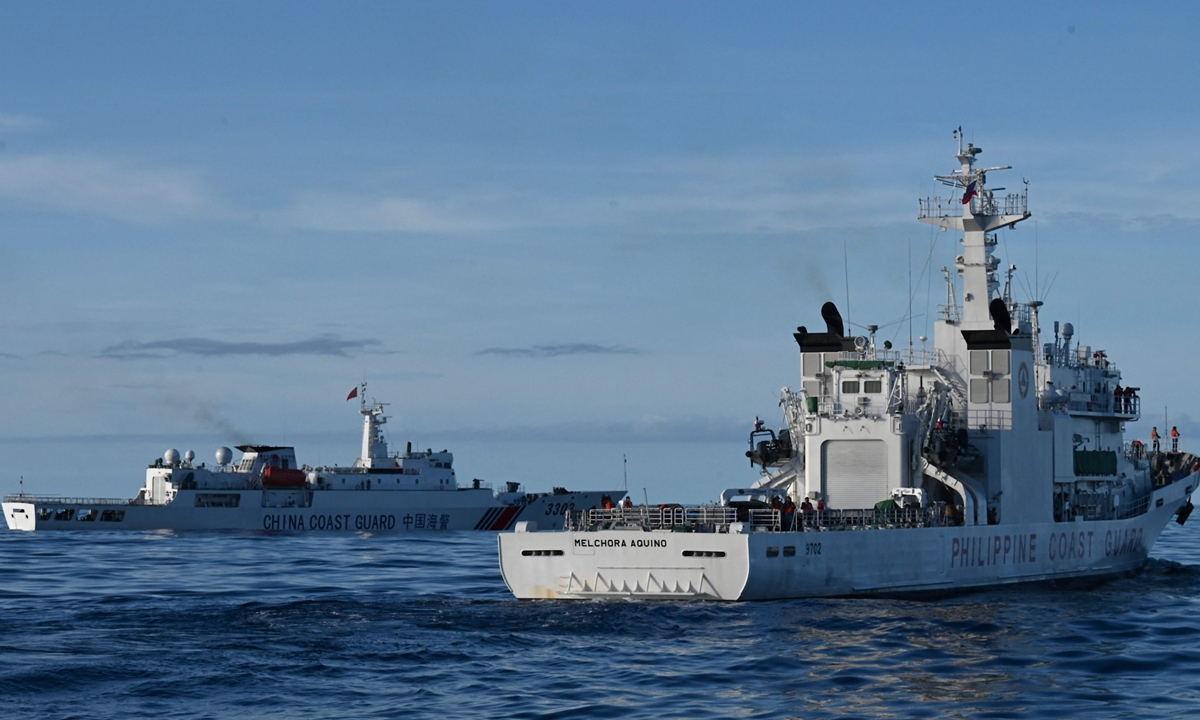Philippines’ efforts to build ‘united front’ against China misguided: expert

China Coast Guard vessel (left) lawfully monitors a Philippine Coast Guard vessel that illegally entered the waters adjacent to Ren’ai Jiao in China’s Nansha Islands on November 10, 2023. Photo: Visual News
Philippine President Ferdinand Marcos Jr is reportedly set to sign an agreement on maritime cooperation with Vietnam during his visit to the country, a move that has been seen as building a “united front” against China over the South China Sea issue. However, analysts noted that any attempt to exclude China and form small cliques to deal with the South China Sea issue will only make the problem more complex.
They also warned that the Philippines’ current approach of inviting countries from outside the region to become involved in the South China Sea issue will only backfire and harm the country’s own national interests in the end.
Marcos Jr will visit Vietnam next week to strengthen relations, and during the visit the two countries are expected to sign a coast guard agreement, according to Philippines media reports.
News site Inquirer.net said that such an agreement will “allow both countries to better manage conflicts in the contested waters and conduct activities in accordance with the principles of international law, the national laws of each party, and international conventions to which both Vietnam and the Philippines are parties.”
Any type of maritime cooperation agreement has more symbolic than practical significance. If both parties wanted to sign it, they would have done so earlier, Xu Liping, director of the Center for Southeast Asian Studies at the Chinese Academy of Social Sciences, told the Global Times on Thursday.
In response to Philippines media claims that this agreement would help Vietnam and the Philippines – which both have maritime disputes with China – to form a “united front,” Xu noted that there are also disputes over maritime issues between Vietnam and the Philippines and some of their problems “may be irreconcilable.”
Any resolution of the South China Sea issue cannot be achieved without China. Trying to exclude China and form small cliques to deal with the South China Sea issue will only make the problem more complex, said Xu, while calling on related regional countries to further promote the conclusion of the Code of Conduct in the South China Sea.
The Philippines has intensified its provocative moves over the South China Sea, leading to strained relations with China and growing worries in the region.
According to media reports, the chief of staff of the Philippine Armed Forces said that the Philippines is planning to develop South China Sea islands and acquire more ships and radars.
In response, Chinese Defense Ministry spokesperson Wu Qian said at a press conference on Thursday that China has indisputable sovereignty over Nansha Qundao and the adjacent waters, which is fully backed by the historical and jurisprudential basis. China resolutely opposes the Philippine side conducting any form of construction on China's islands or reefs illegally occupied by them.
Wu noted that there are some difficulties in the current China-Philippine relationship. The root cause is that the Philippine side has, in collusion with outside powers, broken its promise and kept violating China’s sovereignty and making provocations in the South China Sea.
“We urge the Philippine side to respect history, recognize the reality, and to not go further down the wrong path. China is willing to work together with the Philippines to resolve differences through bilateral dialogue and consultation. However, if the Philippine side insists on taking its own course, we will surely take firm countermeasures,” said Wu.
Some analysts pointed out that since Marcos Jr came to power, he has taken various actions to gain “support” from other countries, especially from the US, and he has claimed the South China Sea issue cannot be resolved solely through bilateral channels. He is now trying to win over Vietnam and is even conducting joint military exercises with countries outside the region. But this makes the situation in the South China Sea increasingly complex and tense.
Xu noted that Marcos Jr wants to use the Indo-Pacific strategy of the US to increase bargaining power in negotiations with China on the South China Sea issue. However, this approach will only backfire and harm the Philippines’ own national interests, Xu said.

